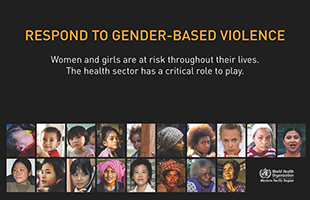
Violence affects women and girls in epidemic proportions across the Western Pacific Region – with severe consequences for their health and well-being. Women and girls are at greatest risk of violence in their homes from someone they know.
On International Women's Day (8 March), the World Health Organization (WHO) enjoins everyone to protect and promote gender equality and women's empowerment. International Women's Day also draws attention to gender norms and inequality as critical factors associated with violence.
"Violence against women is unacceptable," says Dr Shin Young-soo, WHO Regional Director for the Western Pacific. "Efforts to stop violence against women and calls for greater action must be sustained. We must also ensure that gender equality is upheld in order for women and girls to enjoy the right to achieve the highest attainable standard of health."
This year's United Nations-wide theme draws attention to the 2030 agenda, building momentum for the effective implementation of the new Sustainable Development Goals (SDGs). SDG 5 calls for achieving gender equality and empowering all women and girls. It includes, for example, a specific target on the elimination of violence against all women and girls (target 5.2), as well as calling for action on harmful practices and discrimination against women more broadly.
This reiterates that violence against women and girls is rooted in gender inequality. Unequal gender norms and attitudes held by both women and men make violence more acceptable. The United Nations Multi-country Study on Men and Violence in Asia and the Pacific (2013) reported that 56% of men in Papua New Guinea (Bougainville) agreed that there are times when a woman deserves to be beaten.
National surveys using the WHO methodology to measure violence against women and girls found that 71% of women in the Solomon Islands (2009) agreed that a man should show he is the boss, and 49% of women in Cambodia (2015) believed that a husband is justified in hitting his wife under certain circumstances.
Many Member States in the Western Pacific Region are taking impressive steps to promote gender equality and respond to gender-based violence in collaboration with WHO and partners. International Women's Day celebrates these achievements, while providing an opportunity to accelerate action.
"More can and must be done," Dr Shin says. "WHO stands ready to support Member States in raising awareness of the health and social consequences of gender-based violence and mobilize the health sector and its partners and communities to respond."
Responding to gender-based violence and ensuring women's and girls' access to needed services is critical not only for their own healthy futures but also the futures of their families and communities. Healthy girls and women make healthy families, communities and nations.
